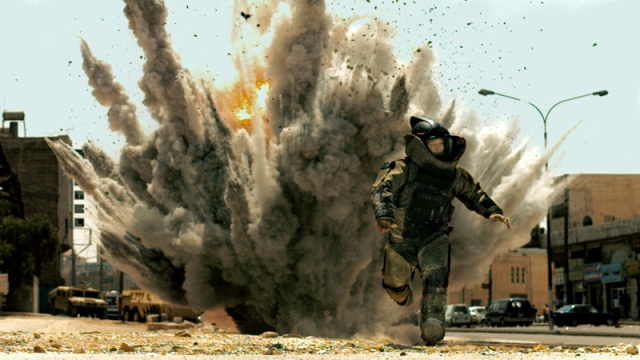
I don't think any film has scored any higher than Kathryn Bigelow's "The Hurt
Locker" this year at Metacritic
(a 93) or Rotten Tomatoes
(97% fresh), but there are dissenters.
Like Breitbart's
Alexander Marlow, who describes his credentials for reviewing the film as:
"I am a young man, athletic, incredibly attractive,
and spent three-and-a-half years fending off hippies in Berkeley. I have not ruled out a stint
in the military. The question I ask myself frequently is why would I put my
life on the line?"
His own unwillingness to serve in a war he seemingly supports whole-heartedly aside, Marlow says this question of motivation is not answered about "The Hurt
Locker"'s protagonist, Sgt. James. He is depicted as a war junkie, and Marlow points out:
"Incredibly, the
mainstream media is trying to position ‘The Hurt Locker' as politically
neutral. The mainstream media are dense. ‘War is a drug.' [quoting the film's
epigraph taken from a Chris Hedges book] Drugs are bad. Thus,
war is bad. This is a left-wing film. End of story."
Well, maybe not, as this blogger, himself a veteran of Iraq, responds
to Marlow's review:
"If war is a drug, and drugs are inherently bad, then war is
bad, and eureka! Marlow dug long and hard enough find a nugget of anti-war,
leftist, Hollyweird propaganda. By applying the phrase to a peculiar model of
moral and political equivalence, Marlow tries to shove the square peg through
the round circle to make a claim about the movie's secret perspective.
"... War is indeed is a drug, a horribly destructive thing
men do to themselves that gives a rush unlike anything you can find on this
planet. I've never had heroin or cocaine, but I bet it hovers near the feeling
of a sniper's bullet missing your head by inches. Or the tremor in your guts
when you have a live body in your sights - how the world drops away, and there
isn't a thing on the planet that matters more than you, him and the rifle in
your hands. And when those rounds explode out of the barrel in a brilliant
flash and the acrid smell of gunpowder burns your nostrils, you know that no
amount of skydiving or drag racing or sex will ever come close to what war
makes you feel in your bones. That's why I can't stop getting speeding tickets
or rewatching old videos from my deployment. I want that feeling back. I
haven't kicked the war habit yet."
Like Marlow, I've never been in a war. But this guy has, and I think we both agree
that Bigelow's intention in the film was to dramatize the point of view and
experience he articulated above and that she succeeds remarkably and without
judgmental moralizing or ideological manipulation.
Also on Breitbart, John Nolte sums up:
"No, I've never been in the military, but when a film's over
I surely know what my opinion of the characters just portrayed up on that
screen is, and I've seen this movie twice now trying to reconcile how
everything listed above can add up to most every review labeling ‘The Hurt
Locker' as ‘apolitical.'
"Has Hollywood
so worn us out that we've dumbed ‘apolitical' down to the point where this portrayal of our
Iraqi allies, our troops and the officers who lead them qualifies? I'm not
looking for John Wayne and I get battlefield cynicism. ‘Blackhawk Down' and ‘Brothers at War' do just fine by me.
But when the men in the ranks display cold, casual racism, an American
Colonel savagely orders that an Iraqi be left to bleed to death and a
profoundly unprofessional protagonist, so demented by war he can no longer love
his own son, repeatedly endangers himself and the men in his charge, I
don't see ‘nuance' or ‘depth' or ‘complicated' characters. What I see is
politics of the worst kind."
So do I, but it's in Nolte's review, not in the movie.

If Iraq
vets have any problems with the film it has more to do with authenticity than
politics. Or so it seems according to this story about
troops' reactions after a screening:
"The characters seemed to grow throughout the film instead
of remaining static, which kept it entertaining," said a sergeant who served in
the same kind of EOD (Explosive Ordinance Disposal) unit as the characters in the movie. "I would tell others to go see it." But, he
adds, "The issue I have with it is people are going to watch this and think
it's realistic, because it looks realistic. They've got Soldiers mostly wearing
uniforms the right way, they look like Soldiers and it looks like Iraq to the
uninformed."
Jim O'Neil, the executive director of an EOD memorial
foundation concluded in the same article:
"The vast majority of everyone I talked to enjoyed the film, and they
appreciated that there is a credible EOD movie. This very dangerous field in
the military has been overlooked in the entertainment industry... While there
was some license taken throughout the film, we enjoyed it... It's a movie, not
a training film."
Nor, apparently, is it a left wing political tract.
















